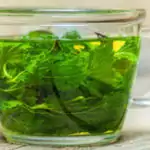
Diet
Spearmint Tea: A Natural Anti-Androgen For PCOS
Nov 17, 2017If the idea of popping PCOS medication (all of which have harmful side-effects, btw) for the rest of your life doesn’t sound like your cup-of-tea, you should try all-natural herbal treatment options. And no list of home remedies for Polycystic Ovarian Syndrome remedy is complete without the mention of spearmint tea.
Spearmint tea is made from the dry leaves of Spearmint herb, native to Europe. It’s milder and naturally sweeter than peppermint and makes for a wonderful cup of tea that can boost the immune system, promote gut healing, fight against inflammation and also offer anti-androgen benefits.
So Why Is Spearmint Tea For PCOS Such A Good Idea?
Women with PCOS usually have excess androgens, which trigger hormonal imbalances. This hyperandrogenism manifests in the form of a variety of distressing PCOS symptoms — menstrual irregularities, fertility issues, excess facial and body hair, cystic acne and unexplained weight gain. The anti-androgen effect of Spearmint tea is what makes it such an excellent herbal remedy for PCOS.
Some rat studies have shown that spearmint has treatment potential for PCOS. It does so through inhibition of testosterone and restoration of follicular development in ovarian tissue.
There are several benefits of spearmint tea for PCOS. It’s a great all natural remedy for:
- Irregular periods
- Cystic acne
- Hirsutism
- Hormonal imbalances
- Low-grade inflammation
- PMS symptoms like cramps, nausea and bloating
- Boosting immunity
- Promoting gut health
- Protecting your heart
- Keeping chronic stress and anxiety at bay
Does Spearmint Tea Really Have Anti-Androgenic Effects?
So how does Spearmint Tea offer all the above-mentioned benefits? In a nutshell:
- It can reduce Free Testosterone levels by 30%. This is the main culprit behind PCOS hirsutism and acne
- It increases Luteinising Hormone (LH) by 30%. This hormone triggers ovulation, maintaining a regular menstrual cycle
- It increases Follicle Stimulating Hormone (FSH) by around 15% to ensure proper maturation of ovarian follicles
Current scientific evidence suggests that spearmint tea may be useful in lowering androgenic hormones in women. It’s possible to see a decrease in free testosterone and an increase in luteinizing hormone (LH) and follicle stimulating hormone (FSH) over a 5-day period of drinking spearmint tea. However, it’s better to gauge real improvements of spearmint tea for PCOS over a longer period of drinking the tea regularly.
A Spearmint Trial conducted in the UK in 2010 found that spearmint herbal tea has significant anti-androgen effects in polycystic ovarian syndrome. 42 women with PCOS and hirsutism were tracked over a period of 1 month, and the participants of the Spearmint tea group were asked to consume 2 cups of tea per day. Free and total testosterone levels were significantly reduced over the 30 day period in the spearmint tea group, while LH and FSH also increased. However, no significant reduction in the ratings of hirsutism was observed. According to scientists, the study duration was not long enough to completely ascertain the extent of benefits of spearmint tea in women with hyperandrogenism.
As most of us know — most herbal remedies require a longer duration to show positive results. Drinking spearmint tea for PCOS is no different. In fact, scientists from the above-mentioned trial concluded that considering the results of the trial, spearmint’s potential benefits for PCOS patients with androgen excess easily outweigh any likely risk.
Another Turkish study found similar results. Researchers at Suleyman Demirel University decided to observe the effect of this herbal tea on the androgen levels in hirsute women. 21 female hirsute patients, 12 with polycystic ovary syndrome and 9 with idiopathic hirsutism were included in the study. They were asked to drink spearmint tea twice a day for a period of 5 days. At the end of the trial, there was a significant decrease in free testosterone and increase in luteinizing hormone. Researchers concluded that spearmint can be an alternative to anti-androgenic treatment for mild hirsutism.
Based on these studies, we can safely say that drinking spearmint tea for PCOS can improve the symptoms of this hormonal disorder. However, no herbal treatment will show dramatic improvements within a few days. Simply put, use spearmint tea for PCOS regularly for some time before expecting any results.
Adding Spearmint Tea To Your PCOS Diet
If you are interested in trying out spearmint tea for PCOS, look for 100% all natural and organic spearmint tea. You can brew the perfect cup of tea from either dried spearmint leaves or from a tea bag. Many brands also offer herbal infusions with other health-promoting herbs like green tea and licorice, so take your pick.
It’s safe to drink 2-3 cups of spearmint tea every day. Personally, I like to drink my tea after breakfast and lunch, as spearmint is also a natural digestive aid. Resist the urge to add any sugar or sweeteners if you’re trying to get your insulin resistance under control.
I find that perfectly brewed spearmint tea has a natural mildly sweet taste with just the right hint of mint to make it delicious all by itself. I like to brew my spearmint tea for 5 minutes, but you can adjust the brewing time for desired strength and taste.
If you’re not a big fan of teas, you could also buy spearmint leaf capsules and take 400-500mg every day. Spearmint essential oil can also be used for topical application.
However, spearmint tea is the most easily accessible and affordable option. And this is a really soothing, calming herbal tea that also helps relax you and keep bloating at bay. Spearmint tea is caffeine-free, which also makes it an ideal choice for those trying to reduce their coffee intake to improve their PCOS-triggered adrenal fatigue.
While this is a mild tea, it’s always best to discuss with your doctor before you start drinking copious amounts of spearmint tea to find relief from your PCOS symptoms. This is particularly important if you are pregnant or breastfeeding.
While dietary changes can definitely have a positive impact in managing PCOD, reversing the condition requires a holistic approach. Learn how to reverse PCOD naturally with Sepalika’s 5-Petal PCOD Programme. Our personalised protocols using a holistic approach help treat PCOD at the root through diet, nutrition, exercise, Ayurveda and magnet acutherapy. What’s more, expert consults via phone and WhatsApp help you always stay on track in your journey to overcome PCOD. Click here to know more.
Our Choice of Spearmint Tea available on Amazon:
DISCLAIMER: We have taken time & effort to pick dietary supplements that are of great quality, have bioavailable ingredients & have nutrients in the correct proportions. Some of the links on this website are affiliate links. Which means we make a commission when you buy, at no extra cost to you. The products we recommend are the ones we believe in.
References:
1. Spearmint herbal tea has significant anti-androgen effects in polycystic ovarian syndrome. A randomized controlled trial – https://www.ncbi.nlm.nih.gov/pubmed/19585478 2. Effect of spearmint (Mentha spicata Labiatae) teas on androgen levels in women with hirsutism – http://onlinelibrary.wiley.com/doi/10.1002/ptr.2074/full 3. Anti-Androgenic Effects of Spearmint Tea (Mentha Spicata) – http://commons.pacificu.edu/pa/618/ 4. Role of Essential Oil of Mentha Spicata (Spearmint) in Addressing Reverse Hormonal and Folliculogenesis Disturbances in a Polycystic Ovarian Syndrome in a Rat Model – http://apb.tbzmed.ac.ir/Portals/0/Archive/Vol7-2017/Alaee.pdf





